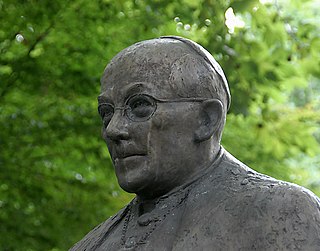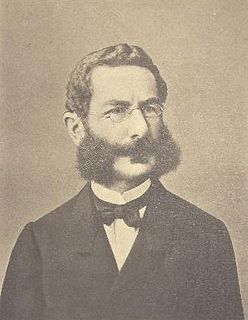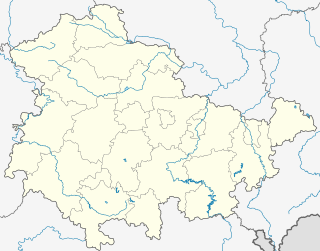Related Research Articles

Monschau is a small resort town in the Eifel region of western Germany, located in the Aachen district of North Rhine-Westphalia.

Josef Richard Frings, was a German Cardinal of the Catholic Church. He served as Archbishop of Cologne from 1942 to 1969. Considered a significant figure in Catholic resistance to Nazism, he was elevated to the cardinalate in 1946 by Pope Pius XII.
Adolf of Altena, Adolf of Berg or Adolf of Cologne, was Archbishop of Cologne from 1193 to 1205.

Albert Stöckl was a German neo-scholastic philosopher and theologian.

Adolf IV of Berg count of Berg from 1132 until 1160 and of Altena, son of Adolf III of Berg count of Berg and Hövel. He married (1st) Adelheid von Arnsberg, a daughter of Heinrich count von Rietberg; then (2nd) Irmgard (?) von Schwarzenberg, a daughter of Engelbert von Schwarzenberg.

Matthias Joseph Scheeben was a German Catholic theological writer and mystic.

Johannes von Geissel was a German Catholic Archbishop of Cologne and Cardinal from the Electorate of the Palatinate.

Theodor, Count von Scherer-Boccard was a Swiss journalist and politician.
Johannes Mötsch is a German archivist and historian.
The Apostolic Nunciature to Bavaria was an ecclesiastical office of the Roman Catholic Church in Bavaria. It was a diplomatic post of the Holy See, whose representative was called the Apostolic Nuncio to Bavaria, a state – consecutively during the nunciature's existence – of the Holy Roman Empire, of its own sovereignty, and then of Imperial, Weimar and finally Nazi Germany. The office of the nunciature was located in Munich from 1785 to 1936. Prior to this, there was one nunciature in the Holy Roman Empire, which was the nunciature in Cologne, accredited to the Archbishop-Electorates of Cologne, Mainz and Trier.

Saalfeld Abbey was an important medieval Benedictine monastery and Imperial Abbey in Saalfeld, Thuringia, Germany. As an imperial abbey, the monastery was under the direct auspices of the Holy Roman Emperor, and enjoyed a degree of sovereignty equivalent to a small micro state within the Empire. The monastery was founded in 1071 and existed until 1526, when it was secularised during the Reformation.

Johann Anton Friedrich Baudri was a German Roman Catholic priest, the Vicar General of the Roman Catholic Archdiocese of Cologne and the auxiliary bishop of Cologne.

The Eltz Feud was a 14th-century feud that arose between rulers of the Trier region on the Moselle and certain members of the knightly class who were acting independently and failing to support their sovereign princes. It came about as a result of attempts in 1331 by the Archbishop of Trier and Elector Baldwin of Luxembourg to re-incorporate the imperial ministeriales or knights of the castles of Ehrenburg, Eltz, Schöneck and Waldeck as vassals into the administrative district of Trier and to subordinate them to a unified, sovereign state administrative structure. Their distance from the power of the imperial government and a weak predecessor of Archbishop Baldwin had allowed the knights to acquire autonomy and rights supposedly under the law of custom, even though they were already vassals and fief holders of the Archbishop.

Caspar Erasmus (Erich) Schieler was a German theologian, church historian and priest in the late 19th century and early 20th century. According to documents provided by Mainz Cathedral and the Diocesan Seminary, Schieler studied philosophy and theology at the Episcopal Seminary in Mainz, receiving the Doctor of Divinity degree. Schieler first served as a priest at the age of twenty-five at Mainz, Cathedral ordained under Bishop Wilhelm Emmanuel von Ketteler in the year 1876. Due to the Kulturkampf, Schieler was interrogated by the German government and forced to pastor his parish in secret, to avoid further attention. While secretly pastoring in Weisskirchen, Schieler began working on his dissertation: Magister Johannes Nider, for which he received the degree of Doctor of Theology, Magna cum Laude in Würzburg, Germany in the year 1886. Schieler then become the Professor of Moral Theology at Diocesan Seminary of Mainz in Baden-Württemberg. After breaking from the Catholic Church and converting to Protestantism, Schieler continued writing books and became a pastor in the German Evangelical Synod of North America, which later merged into the United Church of Christ, a mainline Protestant Christian denomination, with historical confessional roots in the Reformed, Congregational and Lutheran traditions. Schieler served as a Professor of theology and Latin American and German language and literature at the Mission House College, which later became Lakeland University. At the request of the Educational Department, Schieler later took up a teaching position at Redfield College, teaching theology in Redfield, South Dakota. Schieler was then called upon by the German Evangelical Synod of North America, to teach and preach in communities in Hartsburg, Missouri, Hamel and Johannisburg, Illinois and Marion, Wisconsin.

Philipp Wasserburg was a German Roman Catholic writer, publicist and member of the parliament of Hesse. He wrote under the pseudonym Philipp Laicus.
Adelaide of Lauffen was a German noblewoman.

Arnold of Arnoldsweiler (died c. 800 in Ginnizweiler, today Düren-Arnoldsweiler) is a saint of the Roman Catholic Church and was a musician at the court of Emperor Charles the Great, known as Charlemagne. His feast day is 18 July.

Jürgen Kretschmann is a German economist and university president.

Heinrich Bone was a German educator and hymnwriter. He wrote a reader for German studies which was used for higher education in Germany, Belgium, Luxembourg and Austria, until it was banned during the Kulturkampf. He published a hymnal, Cantate!, which was used by several Catholic dioceses and became a model for common hymnals. Some of his own hymns, including paraphrases of Latin hymns, are part of recent hymnals, both Catholic and Protestant, such as "Komm, Schöpfer Geist, kehr bei uns ein" as a paraphrase of the 9th-century hymn for Pentecost, Veni Creator Spiritus.
Karl Faymonville was a German art historian.
References
- Hermann-Josef Reudenbach: Stiftspropst Alfons Bellesheim (1839–1912) und das Buch: ein Beitrag zur Kirchengeschichte und zur Geschichte der Buchkultur. Libelli Rhenani: Schriften der Erzbischöflichen Diözesan- und Dombibliothek zur rheinischen Kirchen- und Landesgeschichte sowie zur Buch- und Bibliotheksgeschichte, 14. Erzbischöfliche Diözesan- und Dombibliothek, Cologne 2006
- August Brecher: Ein Leben im Dienst der Wissenschaft und des Aachener Münsters. Stiftpropst Dr. Alfons Bellesheim 1839–1912, in: Zeitschrift des Aachener Geschichtsvereins 96, 1989, S. 209–372
- Ingeborg Schild/Elisabeth Janssen: Der Aachener Ostfriedhof, publisher Mayersche Buchhandlung, Aachen 1991, ISBN 3-87519-116-1. S. 386–388.